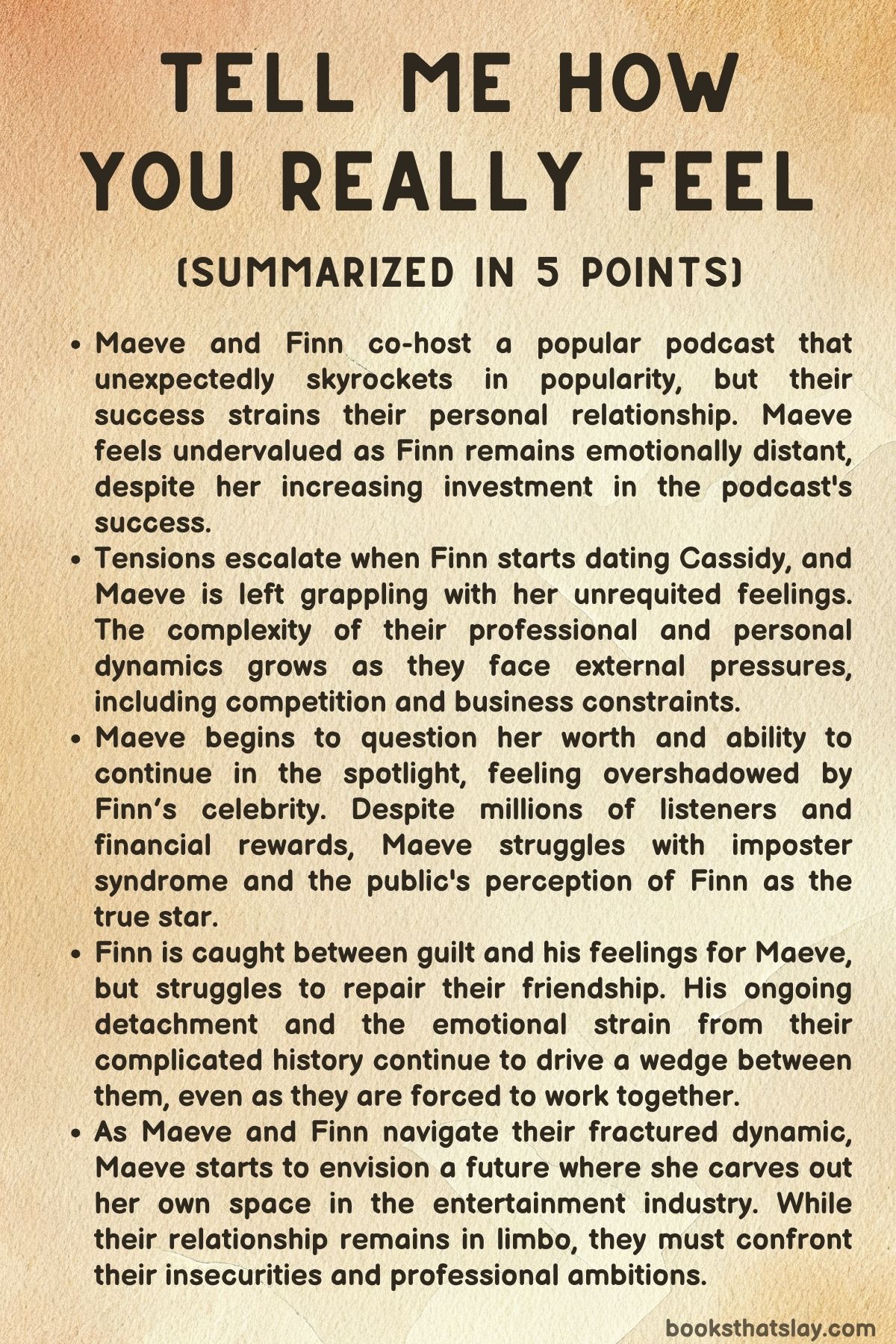Tell Me How You Really Feel Summary, Characters and Themes
Tell Me How You Really Feel by Betty Cayouette is a compelling exploration of personal and professional dynamics, particularly within the world of entertainment. The novel centers on Maeve, a clinical psychology graduate, who co-hosts a podcast with Finn, a privileged yet reluctant celebrity.
Their show, initially a lighthearted venture, quickly becomes a viral success. However, as the pressure mounts, their relationship strains due to differing professional goals, unresolved past emotions, and external pressures. As Maeve navigates her growing insecurities and Finn struggles with emotional distance, they must confront the complexities of love, ambition, and identity, ultimately learning to balance their careers with their personal lives.
Summary
Maeve is a clinical psychology graduate who finds herself unexpectedly thrust into the world of entertainment when she co-hosts a podcast called Tell Me How You Really Feel with Finn, a famous yet emotionally detached celebrity. What started as a fun project quickly escalates in popularity, with their podcast becoming a hit.
However, as they gain fame, so too does the tension between them. Maeve, driven by her passion for the podcast, becomes more invested, while Finn remains emotionally distant, leaving Maeve feeling frustrated and undervalued.
Their personal history complicates matters, as Maeve still holds lingering feelings for Finn, who has moved on to date Cassidy, another public figure.
The growing success of their podcast puts increasing pressure on their professional relationship. Maeve feels that the success of the show is largely due to her hard work, while Finn, despite being the celebrity face of the show, seems detached from the effort Maeve puts into their venture.
Their dynamic becomes more strained when Finn’s new romantic relationship with Cassidy intensifies, leaving Maeve to grapple with her unresolved feelings for him.
Despite the emotional strain, Maeve and Finn are bound by an exclusive contract with Streamify, their podcast’s platform. Maeve, seeking to explore her interests outside of the podcast, envisions a solo show where she can incorporate her clinical psychology background and offer relationship advice.
However, the constraints of their deal prevent her from pursuing this goal, further complicating her personal and professional aspirations. Meanwhile, Finn struggles with guilt, recognizing Maeve’s contributions to their success but feeling unable to emotionally connect with her, despite his acknowledgment that she is the true heart of the show.
The situation reaches a breaking point during a meeting with their managers and agents, where Maeve desperately suggests a solution to the growing tension between them: recording solo episodes of the podcast to alleviate the pressure of constantly working together. However, their business contract prevents this, and Maeve’s frustration deepens.
Matters worsen when they learn that Paul Myers, a competitor in the podcasting world, has signed a deal with Streamify for the same time slot. This revelation adds to the pressure they face, both professionally and personally.
As Maeve’s anxiety grows, she begins to question her worth, feeling like an imposter despite the millions of listeners and financial success. She believes that Finn overshadows her, and the public perception of him as the show’s true star only deepens her self-doubt.
Her internal struggle intensifies, and she starts to question whether she deserves the recognition that comes with the podcast’s success. In a bid to salvage their professional relationship, Maeve and Finn agree to record another episode together, bringing in Finn’s mother, Evangeline, as a guest.
This episode goes viral, but the emotional distance between Maeve and Finn remains unchanged. Maeve continues to struggle with her feelings for him while also striving to carve out a place for herself in the entertainment industry.
Meanwhile, the pressures of fame and their strained relationship begin to take a toll on both of them. At a high-profile event like the Met Gala, Maeve and Finn are forced to pretend to be romantically involved for the cameras, despite Maeve’s discomfort.
Finn, trying to ease her anxiety, arranges for their glam teams to work together and shares lighthearted moments with her, but the tension between them is palpable. The Gala becomes a whirlwind of celebrity encounters and media attention, making Maeve feel overwhelmed, while Finn grapples with his own emotional turmoil.
Back in private, Maeve continues to struggle with her feelings for Finn, as her insecurities and fear of rejection deepen. Her emotions become more complex when she learns that Finn has been spending time with other women, which exacerbates her feelings of betrayal.
She begins to pull away, unsure of where their relationship stands. Despite this, Finn continues to show concern for Maeve, recognizing the emotional damage their strained friendship has caused.
He even begins dating Cassidy as a way to cope with his feelings for Maeve, but the relationship lacks the chemistry that he shares with her.
Despite their emotional turmoil, Maeve and Finn continue working together on the podcast, trying to maintain a professional demeanor. Maeve, determined to keep moving forward with her career, begins to question the role Finn plays in her future.
The tension between them remains, with both individuals struggling to navigate their emotions and professional responsibilities. Finn, after a series of missteps with Cassidy, realizes that he still has feelings for Maeve, but by the time he attempts to mend their relationship, Maeve is no longer ready to embrace him fully.
She has grown more independent and determined to pursue her own career goals.
Throughout the story, Maeve begins to find her voice and assert her independence, realizing that she is more than just Finn’s co-host. She starts taking on solo projects, such as creating a therapy-based reality show, and even partners with Finn’s mother to produce content that reflects her vision.
This collaboration empowers Maeve, helping her gain more control over her professional life and carving a path that reflects her true aspirations.
As Maeve continues to grow professionally and personally, Finn also matures, learning the importance of supporting Maeve in her journey. He acknowledges his privilege and the impact of their gendered dynamic, especially when it comes to their unequal pay.
In a heartfelt apology, Finn expresses his regret for not recognizing Maeve’s contributions sooner and vows to support her growth. This marks a turning point in their relationship, as they begin to build a stronger, more equal partnership.
The story concludes with Finn proposing to Maeve, symbolizing their mutual growth and the merging of their personal and professional lives. The proposal, surrounded by their families, marks the beginning of a new chapter where communication, humility, and shared dreams lay the foundation for their future together.
Ultimately, Tell Me How You Really Feel explores the complexities of ambition, love, and identity in the world of entertainment, highlighting the importance of overcoming insecurities, learning from past mistakes, and finding strength in one another’s success.

Characters
Maeve
Maeve is a dedicated and driven clinical psychology graduate who co-hosts the podcast Tell Me How You Really Feel with Finn. Initially, she views the podcast as a creative outlet, but as it grows in popularity, the pressure to maintain the show’s success begins to affect her deeply.
Maeve is intelligent, self-aware, and ambitious, but she often grapples with feelings of imposter syndrome. Her personal history of feeling overlooked intensifies her anxieties, especially as the fame associated with the podcast brings her into the public eye.
Throughout the story, Maeve is driven by a need for validation, both personally and professionally. Despite her outward success, she struggles with her worth, especially in relation to Finn, who she harbors lingering feelings for.
Her emotional journey involves confronting her insecurities and learning to assert her independence, particularly as she contemplates the future of the podcast and her role in the entertainment industry. Maeve’s evolving self-awareness is evident when she begins to push for more autonomy in her work, leading her to take control of her destiny by exploring solo projects that reflect her vision.
Her complex relationship with Finn adds to her emotional turmoil. She feels deeply betrayed by Finn’s emotional distance, especially after their intimate moment together, and the feelings of confusion and hurt only escalate when Finn starts dating Cassidy.
Maeve’s emotional vulnerability leads to moments of self-doubt, but over time, she finds strength in her own capabilities, ultimately discovering that her worth is not tied to Finn’s validation. Maeve’s growth is marked by her ability to navigate the balance between love, ambition, and personal growth, which culminates in her decision to produce content on her own terms, alongside her growing connection with Finn.
Finn
Finn is a privileged celebrity who co-hosts Tell Me How You Really Feel with Maeve. His celebrity status initially seems to serve as the driving force behind the podcast’s popularity, but Finn’s lack of emotional engagement creates tension in their professional and personal relationship.
Though he acknowledges the success of the podcast and Maeve’s contributions, Finn remains emotionally distant, often caught in a web of confusion about his feelings for Maeve and his guilt over their deteriorating friendship. Finn’s internal struggle centers on his desire to maintain the podcast’s success while navigating the complexities of his relationship with Maeve.
While he acknowledges the growing tension between them, he remains unsure of how to bridge the emotional divide, often resorting to avoiding confrontation rather than addressing the issues head-on.
Finn’s character arc revolves around his recognition of the privilege he enjoys, particularly in contrast to Maeve’s struggle for recognition. He is unaware of the deep impact his actions, including his obliviousness to the pay gap between them, have on Maeve, and it isn’t until Maeve calls attention to these issues that he begins to understand the inequities within their dynamic.
Finn’s growth as a character is significant when he learns to genuinely apologize and take responsibility for his actions, not just in terms of money, but also in terms of his emotional neglect toward Maeve. Despite his emotional confusion, Finn is shown to care deeply for Maeve, and his actions reflect an attempt to make amends.
By the end of the story, Finn’s relationship with Maeve evolves from one of emotional disconnection to one of mutual respect and understanding, where he learns to support her ambitions without overshadowing her.
Cassidy
Cassidy, Finn’s girlfriend, plays a significant role in the emotional landscape of the story. While Cassidy seems to be a long-standing figure in Finn’s life, their relationship lacks the chemistry that Finn shares with Maeve.
Cassidy’s presence in the narrative primarily serves to highlight the emotional conflict within Finn. As Finn struggles with his feelings for Maeve, he turns to Cassidy as a way to cope with his unresolved emotions.
However, it becomes clear that Finn’s relationship with Cassidy is more of a distraction than a genuine connection. Cassidy’s character doesn’t play a major role in terms of personal development, but she acts as a catalyst for Finn’s eventual realization of his true feelings for Maeve.
Despite her limited role in the story, Cassidy symbolizes the external pressures and distractions that Finn faces. Her relationship with him highlights Finn’s struggle to define what he truly wants emotionally, both in terms of his relationship with Maeve and his identity within the world of fame.
Cassidy’s role also subtly underscores the complexities of love and commitment, as Finn’s connection with her contrasts sharply with the deep emotional bond he shares with Maeve.
Evangeline Sutton
Evangeline Sutton, Finn’s mother, becomes an important figure in the narrative as she is brought onto the podcast to help boost its popularity. Evangeline represents the world of privilege that Finn comes from, but her presence also serves to highlight the differences between Maeve and Finn’s backgrounds.
She is a celebrity matriarch who embodies the type of success that Finn has inherited but has not fully embraced. Through her appearance on the podcast, Evangeline symbolizes the external forces that are constantly pushing Finn toward a more conventional career in entertainment, which often clashes with Maeve’s vision for the podcast.
While Evangeline’s role in the story is relatively minor, her impact on Finn is significant. She helps him realize the importance of stepping back at times and letting Maeve shine.
Evangeline’s contribution to the podcast, and her eventual partnership with Maeve, becomes a turning point for Maeve’s own growth. It is through this collaboration that Maeve begins to find her voice and assert control over her career, marking a key moment in her evolution from a reluctant co-host to a confident content creator.
Themes
Ambition and Success
In Tell Me How You Really Feel, ambition plays a crucial role in the lives of Maeve and Finn, especially as they navigate the complex world of fame, success, and their professional podcast. Both characters are driven by different motivations, but the shared success of their podcast becomes a reflection of their personal growth and struggles.
Maeve’s ambition is tied to her desire for validation and autonomy, while Finn’s initial drive stems from his family expectations and his career in the entertainment industry. As the podcast becomes a lucrative venture, the pressure on them grows, particularly for Maeve, who feels like she’s carrying much of the weight.
She grapples with self-doubt, wondering if her contributions are truly appreciated by the audience and if she deserves the success that comes with it. Finn, on the other hand, struggles with balancing his privileged position in the entertainment industry and his role in the podcast’s success.
His ambition is often overshadowed by his emotional detachment, creating a divide between the two. Their professional ambitions clash as Maeve seeks more control over her career, and Finn struggles to meet her halfway.
The story sheds light on the fine line between personal and professional success, particularly for women in the entertainment industry, who often have to fight harder to earn recognition. As the narrative unfolds, Maeve’s journey towards carving out her own path and Finn’s realization of his privilege provide a nuanced exploration of how ambition shapes not just careers, but relationships as well.
Identity and Self-Worth
Maeve’s journey in Tell Me How You Really Feel is a deep exploration of identity and self-worth, particularly in a world that often diminishes her contributions in favor of male-driven narratives. Throughout the book, Maeve is forced to confront her insecurities and doubts about her value, both personally and professionally.
Despite her intelligence and expertise in clinical psychology, she constantly feels overshadowed by Finn’s celebrity status. The podcast, initially an outlet for her creativity and passion, becomes a source of anxiety, as she begins to question if she is truly seen for her own merits or just as a sidekick to Finn’s fame.
Her struggle with imposter syndrome is amplified by the constant comparisons to Finn, who enjoys the limelight while Maeve feels relegated to the background. This theme of self-worth is further complicated by her unresolved feelings for Finn, as she yearns for his validation but simultaneously resents him for not fully recognizing her contributions.
As Maeve navigates her personal and professional challenges, she comes to understand that her worth is not defined by her relationship with Finn or the success of the podcast. Instead, her journey toward self-empowerment is marked by her realization that she has the ability to create her own space in the world, especially as she explores solo ventures like her therapy-based reality show.
The narrative presents a nuanced view of how women, especially in high-profile industries, must fight against both external and internal forces that undermine their worth.
Love and Complicated Relationships
At the heart of Tell Me How You Really Feel is a complex exploration of love and relationships, particularly how they evolve under the weight of personal and professional pressures. Maeve and Finn’s relationship is marked by deep emotional entanglements, past resentments, and unspoken feelings that complicate their ability to move forward.
Their dynamic shifts over the course of the book, as they transition from being friends and co-hosts to navigating romantic tensions. Their emotional connection is palpable, yet neither is fully able to acknowledge or address their feelings, leading to missteps, misunderstandings, and emotional confusion.
Maeve, despite her strong feelings for Finn, is wary of allowing her heart to dictate her actions, especially after Finn begins dating someone else. Her internal conflict between love, resentment, and personal ambition creates a rift between them that they both struggle to overcome.
Finn, on the other hand, is caught between his desire to protect Maeve and his own emotional detachment, making it difficult for him to fully commit to the relationship. The story highlights how love can be both a source of strength and vulnerability, particularly when external pressures, such as career expectations and public scrutiny, threaten to overshadow personal feelings.
As the story unfolds, both characters must come to terms with their emotions, learning that love is not just about romantic gestures but about mutual respect, communication, and growth. Their relationship matures as they navigate these complexities, ultimately leading to a deeper understanding of themselves and each other.
Gender and Privilege
The theme of gender and privilege plays a significant role in Tell Me How You Really Feel, particularly in the way Maeve and Finn navigate their careers in the entertainment industry. Maeve, despite her expertise and hard work, constantly battles the societal forces that diminish her achievements in favor of Finn’s celebrity status.
Her frustrations are compounded by the reality of gender inequality, as she feels that her contributions are often overshadowed by Finn’s fame and the industry’s bias toward male-driven narratives. This theme is highlighted when Maeve faces the stark contrast in their pay, with Finn unknowingly benefiting from a salary disparity that reflects broader systemic issues.
His privilege, while not malicious, becomes a source of tension, as Maeve feels both betrayed and devalued by the oversight. Finn’s journey toward understanding the dynamics of privilege is one of growth, as he begins to recognize the ways in which he benefits from societal structures that disadvantage Maeve.
This realization not only strengthens their relationship but also allows Finn to make efforts to rectify the imbalance. The book explores how the entertainment industry perpetuates gendered power dynamics, often forcing women to work harder to gain the same recognition and rewards as their male counterparts.
Maeve’s eventual decision to take control of her career and partner with Finn’s mother is an empowering moment that symbolizes her reclaiming her narrative and pushing back against the forces that have tried to minimize her.
Professional Boundaries and Personal Growth
The theme of professional boundaries and personal growth is explored through the evolving relationship between Maeve and Finn in Tell Me How You Really Feel. As the success of their podcast grows, the pressure to maintain a professional relationship while navigating personal emotions becomes increasingly difficult.
Maeve, in particular, finds it challenging to separate her professional aspirations from her personal feelings for Finn. Their shared career trajectory creates a tension that threatens their friendship and working partnership.
Maeve’s desire to have more control over her career, particularly through solo projects, reflects her need for independence and growth outside of Finn’s influence. The book explores the delicate balance between maintaining professional boundaries and personal growth, especially when both individuals in a partnership have different goals and emotional needs.
As they struggle to reconcile their past, present, and future ambitions, they are forced to confront their individual desires and the role their relationship plays in shaping their professional lives. Ultimately, Maeve’s journey is about learning to assert her independence, not just in her career but also in her emotional life.
The narrative demonstrates the importance of setting boundaries in professional relationships and the personal growth that comes from navigating such challenges. Through their experiences, both characters learn that professional success and personal fulfillment are not mutually exclusive but require conscious effort and communication.


